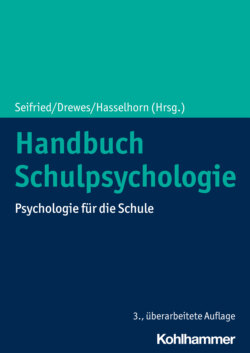Читать книгу Handbuch Schulpsychologie - Группа авторов - Страница 103
На сайте Литреса книга снята с продажи.
Literatur
ОглавлениеAnthun, R. (1999). Quality and improvement potential in school psychology services. School Psychology International, 20(2), 163–175.
Arnold, J. (2020). Fortführung der bundesweiten Evaluation »Wir.EB« bestätigt hohe Wirksamkeit der Erziehungs- und Familienberatung, insbesondere im Bereich Resilienzförderung. Zeitschrift für Kindschaftsrecht und Jugendhilfe ZKJ, 2, 53–56.
Atria, M., Reimann, R. & Spiel, C. (2006). Qualitätssicherung durch Evaluation. Die Bedeutung von Zielexplikation und evaluativer Haltung. In C. Steinebach (Hrsg.), Handbuch Psychologische Beratung (S. 574–586). Stuttgart: Klett-Cotta.
BDP Sektion Schulpsychologie (Hrsg.). (2014). Schulpsychologie in Deutschland. Berufsprofil. Berlin: BDP. Zugriff am 11.05.2021 unter www.bdp-schulpsychologie.de/aktuell/2018/180914_berufsprofil.pdf
Cline, T. (1994). Quality assurance in an educational psychology service: What can we learn from earlier experience in service evaluation? School Psychology International, 15(3), 209–234.
Dagger, T. S., Sweeney, J. C. & Johnson, L. W. (2007). A hierarchical model of health service quality: Scale development and investigation of an integrated model. Journal of Service Research, 10(2), 123–142.
Ditton, H. (2018). Evaluation und Qualitätssicherung im Bildungsbereich. In R. Tippelt & B. Schmidt-Hertha (Hrsg.), Handbuch Bildungsforschung (S. 757–777). Wiesbaden: Springer Fachmedien.
Dollase, R. (2010). Situation der Schulpsychologie in Deutschland und Niedersachsen im internationalen Vergleich. Gutachten im Auftrag der Max-Träger-Stiftung.
Donabedian, A. (2002). An introduction to quality assurance in health care. Oxford: Oxford University Press, Incorporated.
Farrell, P., McFarland, M., Gonzalez, R., Hass, M. & Stiles, D. A. (2014). The role of international accreditation in promoting academic and professional preparation in school psychology. International Journal of School & Educational Psychology, 2(3), 205–213.
Fuchs, T., Sidiropoulou, E., Vennen, D. & Fisseni, H. J. (2003). Bonner Fragebogen für Therapie und Beratung (BFTB). Göttingen: Hogrefe.
Gaebel, W., Großimlinghaus, I., Heun, R., Janssen, B., Johnson, B., Kurimaz, T. et al. (2015). European Psychiatric Association (EPA) guidance on quality assurance in mental healthcare. European Psychiatry, 30(3), 360–387.
Hensen, P. (2019). Qualitätsmanagement im Gesundheitswesen: Grundlagen für Studium und Praxis (2. Aufl.). Cham: Springer.
International School Psychology Association (2016). The accreditation of professional training programs in school psychology. Part 1. The International School Psychology Associations’s training standards. Zugriff am 11.05.2021 unter www.ispaweb.org/wp-content/uploads/2020/05/Microsoft-Word-STANDARDS-January-2020-cx.-1.pdf
International Organizational for Standardization (1992). ISO 9000: International standards for quality management. Genève, Switzerland: International Organization for Standardization.
Jeck, S. & Seifried, K. (2011). Mindeststandards für die statistische Erfassung und Evaluation schulpsychologischer Arbeit. Wiesbaden: Unveröffentlichte Dokumentation zur Referententagung der Sektion Schulpsychologie und des Hessischen Kultusministeriums vom 19.09.2011.
Köller, O. (2020). Evaluation pädagogisch-psychologischer Maßnahmen. In E. Wild & J. Möller (Hrsg.), Pädagogische Psychologie (3. Aufl., S. 335–348). Springer.
Kratochwill, T. R. & Shernoff, E. S. (2003). Evidence-based practice: Promoting evidence-based interventions in school psychology. School Psychology Quarterly, 18(4), 389–408.
Müller, B., von Hagen, A., Vannini, N., & Büttner, G. (2021). Measurement of the Effects of School Psychological Services: A Scoping Review. Frontiers in psychology, 12, 606228.
Newman, D. S., Simon, D. J. & Swerdlik, M. E. (2019). What we know and do not know about supervision in school psychology: A systematic mapping and review of the literature between 2000 and 2017. Psychology in the Schools, 56(3), 306–334.
Nußbeck, S. (2010). Einführung in die Beratungspsychologie. München: Ernst Reinhardt.
Rahill, S. A. (2018). Parent and teacher satisfaction with school-based psychological reports. Psychology in the Schools, 55(6), 693–706.
Schubert, F.-C., Rohr, D. & Zwicker-Pelzer, R. (2019). Beratung: Grundlagen – Konzepte – Anwendungsfelder. Wiesbaden: Springer Fachmedien.
Sedlak, A. & Bachmann, G. (2020). Supervisionskonzept für die hessischen Schulpsychologinnen und Schulpsychologen. Frankfurt: Kompetenzzentrum Schulpsychologie Hessen.
Stallard, P. (1996). The role and use of consumer satisfaction surveys in mental health services. Journal of Mental Health, 5(4), 333–348.
Stufflebeam, D. L. (1972). Evaluation als Entscheidungshilfe. In C. Wulf (Hrsg.), Evaluation. Beschreibung und Bewertung von Unterricht, Curricula und Schulversuchen (S. 113–145). München: R. Piper & Co. Verlag.
Temme, K. & Jeck, S. (2007). Qualitätsmanagement in der Schule. In T. Fleischer, N. Grewe, B. Jötten, K. Seifried & B. Sieland (Hrsg.), Handbuch Schulpsychologie. Psychologie für die Schule (S. 427–437). Stuttgart: Kohlhammer.
Warschburger, P. (Hrsg.). (2009). Beratungspsychologie. Heidelberg: Springer.
WHO (World Health Organisation) (2003). Quality improvement for mental health. In Mental Health Policy and Service Guidance Package. Geneva: WHO.
